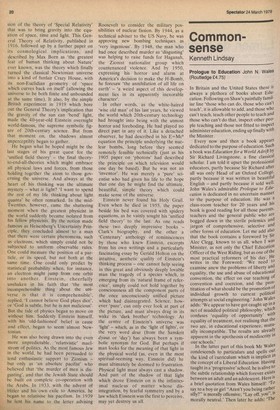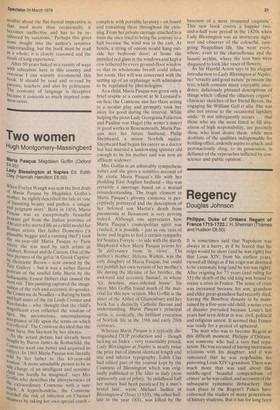Common
sense
Kenneth Lindsay
Prologue to Education John N. Wales (Routledge £4.75) In Britain and the United States there i5 always a plethora of books about Education. Following on Shaw's painfully familiar line 'those who can do, those who can't teach', it is allowable to add, and those who can't teach, teach other people to teach and those who can't do that, inspect other people teaching and those not fitted to inspect administer education, ending up finally with the Minister.
Every now and then a book appears dedicated to the purpose of education. Such a book was Education for a World Adrift by Sir Richard Livingstone, a fine classical scholar. I am told it upset the professional educators, partly because Sir Richard after all was only Head of an Oxford College, partly because it was written in beautiful English — and partly because it sold well John Wales's admirable Prologue to Education is dedicated in no uncertain manner to the purpose of education. He was .a class-room teacher for 20 years and his book is good reading for all those parents. teachers and the general public who are bogged down in the sterile polemics and jargon of comprehensive, selective and other forms of education. Let me add also that the book contains a foreword by Sit' Alec Clegg, known to us all, when I was Minister, as not only the Chief Education Officer of the West Riding, but as one of the most practical reformers of his day. He writes in the Foreword: 'We need to examine anew the problems of liberty and equality, the use and abuse of educational convention, the effect on our teaching of convention and coercion, and the prostitution of what should be the promotion of individual growth to current political attempts at social engineering.' John Wales adds: 'We appear to have got caught up In a net of muddled political philosophy, which confuses 'equality of opportunity' with equality of treatment, not realising that the two are, in educational experience, mutually incompatible. The results are already apparent in the apotheosis of modiocrity in our schools.' In the latter part of this book Mr Wales condescends to particulars and spells out the kind of 'curriculum which is implicit in the concept of a Liberal Education. Having taught in a 'progressive' school, he is alive to the subtle relationship which forever exists between an adult and an adolescent. Here Is a brief quotation from Wales himself: 'To say to a boy or girl "Aren't you being rather silly?" is morally offensive; "Lay off, you'', 15 morally neutral.' Then later he adds: 'The trouble about the flat-footed imperative is that, used more than occasionally, it becomes ineffective and has to be reinforced by sanctions.' Perhaps this gives some insight into the author's sensitive understanding, but the book must be read as a whole; it is closely reasoned and the result of long experience.
.After 50 years linked in a variety of ways With education here in this country and overseas I can warmly recommend this book. It should be read and re-read by Parents, teachers and also by politicians. The economy of language is deceptive because it conceals so much inspired common-sense.



































 Previous page
Previous page